JPIAMR will be participating in a high-level meeting in Brussels, on January 17th 2019, on the development of ECRAID, the European Clinical Research Alliance on Infectious Diseases. ECRAID envisages a European-wide sustainable clinical research organization for infectious diseases and AMR, antimicrobial resistance. Laura Marin, JPIAMR Head of Secretariat, will participate in panels, etc.
ECRAID’s vision is to create a coordinated and permanent European clinical research infrastructure for clinical research on infectious diseases. The focus is on two major challenges: emerging infectious diseases with epidemic or pandemic potential, caused by new or re-emerging pathogens, and AMR (antimicrobial resistance). ECRAID will be enable clinical research to be faster and easier having rapid access to and knowledge of developed clinical and laboratory sites. Trials will be conducted continuously to expand on knowledge and experience.
The organisations aim is to protect public health by generating evidence in order to improve diagnosis, prevention, and treatment. The ECRAID mission is to facilitate and develop world class research to protect citizens of Europe against AMR (antimicrobial resistance) and infectious diseases, over the long term. Professor Herman Goossens together with epidemiologist Marc Bonten, is the project coordinators of ECRAID.
There will be panel discussions with clinical research networks, preclinical research networks, pharmaceutical and diagnostic companies,
SMEs, etc. Together with speakers such as EU Commissioner Carlos Moedas, Herman Goossens, Marc Bonten, Magda Chlebus, Executive Director, Science Policy & Regulatory Affairs, EFPIA and Jeremy Farrar, Director of the Wellcome Trust, and others. This is a closed meeting.




